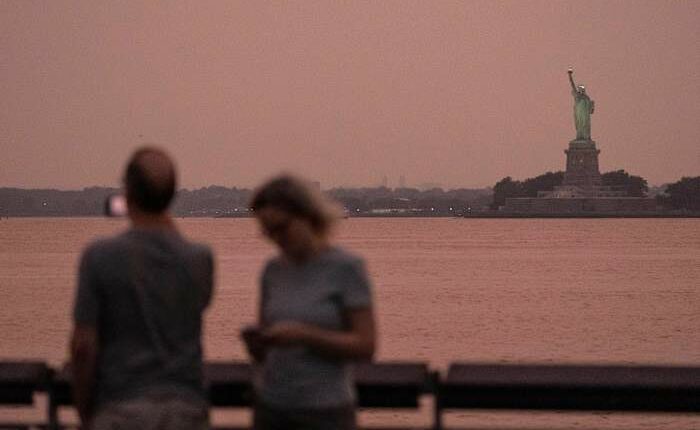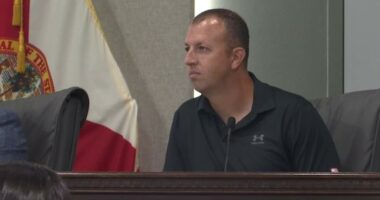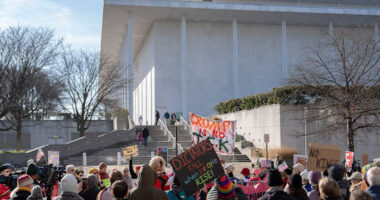Share this @internewscast.com

The assertive statements and letters are brimming with indignation: Republican lawmakers from the U.S. have accused Canada of not doing enough to manage wildfires and smoke that have contaminated the air across several states this summer.
“Instead of enjoying family vacations at Michigan’s scenic lakes and campgrounds, for the third summer running, residents in Michigan are compelled to inhale hazardous air due to Canada’s inability to prevent and control wildfires,” declared a statement recently from the state’s Republican congressional delegation, mirroring similar communications from Republicans in Iowa, New York, North Dakota, Minnesota, and Wisconsin.
These lawmakers have insisted on increased forest thinning, controlled burns, and other fire prevention tactics. They caution that the smoke is damaging bilateral relations and suggest that the U.S. could raise it during trade discussions.
However, they have notably overlooked the impact of climate change—a significant and myopic oversight, according to climate researchers. This stance also disregards the substantial U.S. contribution to greenhouse gases from burning fossil fuels like coal and gas, which lead to more severe heatwaves and droughts, thereby creating conditions conducive to more destructive wildfires, experts argue.
“In reality, Canada could place blame on the U.S. for the growing number of fires,” stated Jennifer Francis, a climate scientist at the Woodwell Climate Research Center in Cape Cod, Massachusetts.
On Tuesday, Canada announced nearly $46 million in funds designated for wildfire prevention and risk assessment research projects. Nevertheless, Corey Hogan, parliamentary secretary to the federal energy and natural resources minister, mentioned that international collaboration is necessary.
“There’s no people that want to do more about wildfires than Canadians,” Hogan said. “But I think this also underlines the international challenges that are brought on by climate change … we need to globally tackle this problem.”
The country has “been fighting wildfires in this country at unprecedented rates since 2023,” when Canada saw its largest wildfire on record, said Ken McMullen, president of the Canadian Association of Fire Chiefs. This year’s first fire started in April, one of the earliest on record, and 2025 is now the second-worst year.
As of Thursday, more than 700 wildfires were burning across the country, two-thirds of them out of control, with more than 28,000 square miles (72,520 square kilometers) burned in 4,400 wildfires so far this year, according to the Canadian Interagency Forest Fire Centre. That’s almost five times the surface area that’s burned so far in the U.S. this year. Most wildfires are started by people, sometimes on purpose but mostly by mistake, though McMullen said lightning is the culprit in many of Canada’s fires, especially in remote areas.
McMullen said he has no interest in debating the role of climate change, but data show that something has changed. Sloughs and basins have dried up and water that once lapped at people’s back doors in Canada’s lake communities now is often hundreds of feet away.
“People can make up their own mind as to why that is,” he said. “But something clearly has changed.”
Denying climate change
President Donald Trump has called climate change a hoax — a belief echoed by many in the GOP — and his administration has worked to dismantle and defund federal climate science and data collection, with little to no pushback from Republicans in Congress.
He’s proposed to revoke the scientific finding that carbon dioxide and other greenhouse gases endanger public health and welfare — the central basis for U.S. climate change action. He’s declared a national energy emergency to expedite fossil fuel development, canceled grants for renewable energy projects and ordered the U.S. to withdraw from the Paris Climate Agreement, aimed at limiting long-term global warming to 2.7 degrees Fahrenheit (1.5 degrees Celsius) above preindustrial levels.
The Associated Press reached out to more than half a dozen Republicans who criticized Canada but none returned phone calls or emails.
Democratic Rep. Chellie Pingree of Maine said the wildfires are jeopardizing health and air quality in her state, too, but faulted Republicans for failing to meet the crisis head on — beginning by acknowledging climate change.
“Rather than accept this reality and work together to find proactive, common-sense solutions for preventing and mitigating these fires, Republicans are burying their heads in the sand,” she said.
Wisconsin Rep. Gwen Moore, a Democrat, criticized her Republican colleagues’ letter to Canada’s U.S. ambassador, saying those “who are in denial about climate change shouldn’t be writing letters prescribing people’s actions to try to contain it.”
Difficult solutions
McMullen, the Canadian wildfire expert, said battling the fires isn’t as simple as many seem to believe.
The country and its territories are vast and fires are often in remote areas where the best — and sometimes only — course of action if there are no residents or structures is to let them burn or “it is going to just create another situation for us to deal with in a year or two or 10 or 20 years from now,” McMullen said.
Prescribed burns to clear underbrush and other ignition sources are used in some areas, but aren’t practical or possible in some forests and prairies that are burning, experts said.
McMullen has advocated for a Canadian forest fire coordination agency to help deploy firefighters and equipment where they’re needed.
But as for stopping worsening fires, “I don’t think there’s much they can do,” said University of Michigan climate scientist Jonathan Overpeck. He noted that hotter temperatures are melting permafrost in northern Canada, which dries out and makes the vast boreal forests far more likely to burn.
Instead, the two countries should collaborate on climate change solutions “because our smoke is their smoke, their smoke is ours,” Overpeck said. “As long as this trend of warming and drying continues, we’re going to get a worsening problem.
“The good news is … we know what the cause is … we can stop it from getting worse.”
___
The Associated Press’ climate and environmental coverage receives financial support from multiple private foundations. AP is solely responsible for all content. Find AP’s standards for working with philanthropies, a list of supporters and funded coverage areas at AP.org.
Copyright 2025 The Associated Press. All rights reserved. This material may not be published, broadcast, rewritten or redistributed without permission.












